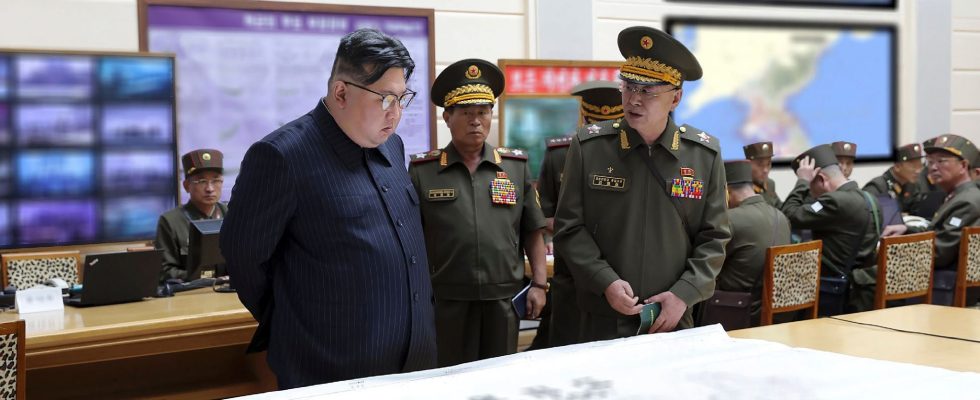Worrying signals raise fears of a year 2024 under high tension on the Korean peninsula. The year also started with the sound of cannons, with some 200 North Korean artillery shots on the morning of Friday January 5 along the “Northern limit line”, the maritime border between the two Koreas. Seoul had to call on residents of Yeonpyeong Island, close to this area, to seek shelter.
This comes as leader Kim Jong-un called for increased production of missile launchers during a visit to an arms factory, in preparation for a “military confrontation” with South Korea and the United States .
Some experts in Seoul also fear a seventh North Korean nuclear test. “Wishing to demonstrate its military capabilities to the world and its population, Russia could carry out a nuclear test next year,” researcher Hyun Seung-soo estimated in mid-December during a conference at the Institute. Korean for National Unification (Kinu), a public analysis center, for which this would “open the way” for Pyongyang to imitate Moscow. A perspective supported by the rapprochement of the two neighbors since the start of the war in Ukraine, materialized in September 2023 by a visit to Russia by the North Korean leader, Kim Jong-un. Institute experts are planning a new bilateral summit, with a visit in 2024 by Russian President Vladimir Putin to Pyongyang. On January 4, the United States even accused North Korea of having provided Russia with ballistic missile launch systems and several ballistic missiles, which kyiv cannot yet confirm.
Record missile launches in 2023
North Korea’s last nuclear test dates from 2017. The decline in tensions the following year and the summits between Kim Jong-un and the then American president, Donald Trump, had put the threat on hold. It resurfaced after the election, in 2022, of conservative Yoon Suk-yeol as president of South Korea, who toughened his tone towards Pyongyang. Since then, it’s been climbing. The North’s missile tests are matched by increasingly spectacular military maneuvers between the South and its American ally, against a backdrop of intensifying cooperation between Seoul, Washington and Tokyo.
The end of 2023 was marked by a further deterioration of the situation with a record missile launch by Pyongyang and the success, in November, of putting its first observation satellite into orbit. Seoul responded by suspending the agreement concluded in 2018 to limit the risks of clashes between the two neighbors, and which established, in particular, buffer zones along the demilitarized zone (DMZ) which divides the peninsula into two and of the maritime line, in the Yellow Sea.
As for the nuclear threat, it resurfaced when Kim Jong-un witnessed, on December 19, the firing of an intercontinental ballistic missile (ICBM), a Hwasong-18 that could be equipped with a nuclear warhead, promising “to new offensive actions [contre les] hostile forces”, i.e. the United States and its allies. Then there was the revelation, on December 22, by the International Atomic Energy Agency (IAEA), that North Korea would have put it into service at the end of 2023 a new light water reactor at its Yongbyon nuclear site.”[Un tel réacteur] can generate plutonium in its spent fuel. This plutonium can then be separated during reprocessing, a worrying prospect,” worries Rafael Grossi, director general of the IAEA.
Financing your programs through the theft of cryptocurrencies
Added to this are accelerated progress in the North’s other military technologies. According to specialist analyst Hong Min, the regime could send one or even two additional satellites in 2024, while improving its solid fuel missiles (less expensive, easier to use and store than liquid fuel).
To finance these programs, North Korea has perfected its expertise in cryptocurrency theft. The practice would have earned it, according to the Insikt research group, from the company Recorded Future, 1.7 billion dollars in 2022, the equivalent of 5% of the country’s economy or 45% of its military budget. .
In addition to its rapprochement with Russia, to which it has, according to the Americans, supplied a thousand containers of military equipment for the war in Ukraine, it is strengthening its commercial cooperation with China. As a result, the severe sanctions imposed by the UN have only a very limited effect.
In a context of stalled dialogue with Washington or Seoul, the re-election of Joe Biden could continue to exacerbate tensions, and North Korean “provocations” are to be feared. As for the return of Donald Trump, who had formed a “quasi-bromance” in 2018 and 2019 with Kim Jong-un, it is difficult to say whether it would calm the situation. The geopolitical context has changed, and the South is no longer led by the progressive Moon Jae-in, who was able to convince Trump to get closer to the North Korean leader, by promising him the possibility of a Nobel Peace Prize .
.
